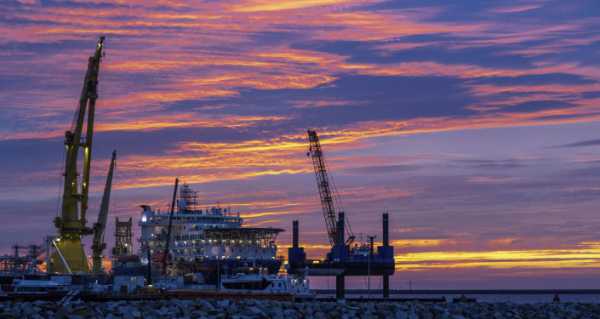
Last week, after German authorities announced that they would be treating Russian opposition figure Alexei Navalny’s case as an “attempted murder by poisoning”, some German lawmakers and their European colleagues pressed Berlin to end the Nord Stream 2 gas pipeline project.
The final decision on the future of the Nord Stream 2 gas pipeline project in connection with the Navalny case will be Europe’s to make, not Berlin’s, Chancellor Angela Merkel has said, according to dpa.
Speaking at a closed meeting of the Christian Democratic Union-Christian Social Union on Tuesday, Merkel reportedly told faction leaders that “a final decision has not been taken” on the Nord Stream 2 issue.
Last week, German authorities announced that a Bundeswehr analysis of Navalny’s samples had found that he had been poisoned by a nerve agent from the so-called ‘Novichok’ group, the same poison which UK authorities accused Russian intelligence of using against a former double agent in southern England in 2018.
Merkel said that German authorities would be treating the Navalny case as “an attempted murder by poisoning” and would consult with NATO and European Union allies and partners on how to proceed.
Earlier Tuesday, the Russian Foreign Ministry reiterated that Moscow expects Berlin to share all the available data regarding Navalny, including the results of the Bundeswehr’s lab tests and other ‘evidence’ they may have.
Last week, Russian Foreign Intelligence Service director Sergei Naryshkin told Sputnik that it “could not ruled out” that foreign intelligence services were involved in the situation surrounding Navalny’s alleged ‘poisoning’, given the sudden appearance of the ‘evidence of poisoning’ following his transfer out of Russia.
Less than a day before the ‘poisoning’ announcement last week, Merkel told US senators threatening Germany with sanctions over Nord Stream 2 that the pipeline project would be completed, regardless of any threats.
Navalny fell gravely ill on August 20 during a Moscow-bound flight from the Siberian city of Tomsk. His plane made an emergency landing in Omsk, and doctors worked round-the-clock for two days to save his life before he was flown to Germany aboard a charter flight.
On Monday, the German doctors treating Navalny announced that he had come out of a coma and was responding to speech stimuli, and was being weaned off mechanical ventilation.
The Navalny case has led some German lawmakers to put pressure on the government to scrap the Nord Stream 2 gas pipeline project with Russia as ‘punishment’ for the opposition politician’s alleged poisoning. However, others, including Die Linke lawmaker Klaus Ernst, have called for a thorough joint investigation into the allegations, and pointed out that cancelling the energy project would only economically benefit the United States, while Germany, Russia, and Europe would suffer losses.
Last week, Austrian Foreign Minister Alexander Schallenberg urged Berlin to decouple the Navalny case from Nord Stream 2, and said that all accusations must be substantiated.
Nord Stream 2 is a joint venture between Russia’s Gazprom and major Western European energy companies including Germany’s Uniper and Wintershall, Austria’s OMV, France’s Engie, and the UK-Dutch conglomerate Royal Dutch Shell. When completed, the project will add 55 billion cubic meters in additional annual capacity for gas deliveries from Russia to Germany through the Baltic Sea, thereby doubling the capacity of the existing Nord Stream network and turning Germany into a major energy hub.
US authorities have repeatedly sought to torpedo the project, threatening crushing sanctions against its participants, and proposing more expensive American liquefied natural gas to European customers instead.
Sourse: sputniknews.com






